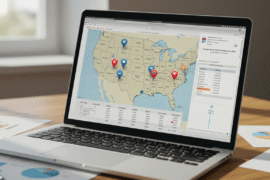This article may contain references to products or services from one or more of our advertisers or partners. We may receive compensation when you click on links to those products or services. Nonetheless, our opinions are our own.
The information presented in this article is accurate to the best of our knowledge at the time of publication. However, information is subject to change, and no guarantees are made about the continued accuracy or completeness of this content after its publication date.
- Best Small Business Checking Accounts 2025
- Key Features to Look For
- Top Small Business Checking Accounts
- Frequently Asked Questions
- What is the best account for high transaction volume?
- Are there accounts with no monthly fees?
- How can I check if an account works with my accounting software?
- What are typical minimum balance requirements?
- Can I access my account on mobile?
- Can I switch accounts easily?
- Are credit unions better than national banks?
- Can I earn rewards?
- Recommended Reads
Best Small Business Checking Accounts 2025
Choosing the right small business checking account in 2025 is important for managing cash flow, reducing costs, and supporting growth. With many options from digital-first banks to traditional institutions it’s important to compare features like fees, transaction limits, and online tools.
Key Features to Look For
- Monthly Fees: Look for accounts with no fees or easy waivers to save money.
- Transaction Limits: Some accounts have unlimited transactions; others charge extra after a set number.
- Digital Access: Mobile and online banking make managing money easier.
- Accounting Software Integration: Sync with QuickBooks, Xero, or Wave for easy bookkeeping.
- Customer Support: Reliable service keeps your business running smoothly.
Comparing Fees and Requirements
Bank fees can reduce profits, so check monthly fees, minimum balances, and free transaction limits.
Interest and Account Benefits
Most checking accounts earn little interest, but some high-yield or rewards accounts provide small returns. Bundled services like merchant accounts or credit lines can add value.
| Account Type | Interest Rate | Monthly Fee |
|---|---|---|
| Standard Checking | 0.05% | $10 |
| High-Yield Checking | 1.00% | $5 |
| Reward Checking | 0.75% | $0 |
Voted "Best Overall Budgeting App" by Forbes and WSJ
Monarch Money helps you budget, track spending, set goals, and plan your financial future—all in one app.
Get 50% OFF your first year with code MONARCHVIP
Top Small Business Checking Accounts
- Fidelity Bank: No monthly fees, unlimited transactions, strong digital tools.
- Chase Business Complete Banking: ATM access, interest, and bonus cash offers.
- Wells Fargo Business Choice Checking: Best for moderate transactions; fee waived with qualifying balances.
- Bank of America Business Advantage Checking: Online banking, multi-user access, and reporting tools.
| Account | Transactions | Monthly Fee |
|---|---|---|
| Fidelity Bank | Unlimited | $0 |
| Chase Business Complete | Unlimited | $15 |
| Wells Fargo Choice | Up to 100 | $10 |
| Bank of America Advantage | Unlimited | $16 |
Choosing the Right Account for Your Business
Consider your business size, transaction frequency, digital needs, and additional services. The right account depends on your unique requirements.
Tips for Maximizing Your Business Checking Account
- Track all fees to avoid surprises.
- Use accounting software integrations to simplify bookkeeping.
- Build a relationship with your banker for guidance and support.
- Enable alerts for deposits, spending, and fraud notifications.
- Review your account yearly to ensure it meets your needs.
Frequently Asked Questions
What is the best account for high transaction volume?
Accounts with unlimited transactions like Fidelity Bank or Chase, are best.
Are there accounts with no monthly fees?
Yes, many waive fees with eStatements or minimum balances.
How can I check if an account works with my accounting software?
Look for compatibility with QuickBooks, Xero, or Wave on the bank’s website.
What are typical minimum balance requirements?
They range from $0 to $1,500, sometimes to waive fees.
Can I access my account on mobile?
Yes, most banks have apps for deposits, transfers, and alerts.
Can I switch accounts easily?
Yes, but finish all transactions before closing your old account.
Are credit unions better than national banks?
Credit unions may offer lower fees and personalized service but may lack advanced digital features.
Can I earn rewards?
Some accounts offer cash back or bonuses for card use or balances.

Reviewed and edited by Albert Fang.
See a typo or want to suggest an edit/revision to the content? Use the contact us form to provide feedback.
At FangWallet, we value editorial integrity and open collaboration in curating quality content for readers to enjoy. Much appreciated for the assist.
Did you like our article and find it insightful? We encourage sharing the article link with family and friends to benefit as well - better yet, sharing on social media. Thank you for the support! 🍉
Article Title: Best Small Business Checking Accounts 2025
https://fangwallet.com/2025/10/30/best-small-business-checking-accounts-2025/The FangWallet Promise
FangWallet is an editorially independent resource - founded on breaking down challenging financial concepts for anyone to understand since 2014. While we adhere to editorial integrity, note that this post may contain references to products from our partners.
The FangWallet promise is always to have your best interest in mind and be transparent and honest about the financial picture.
Become an Insider

Subscribe to get a free daily budget planner printable to help get your money on track!
Make passive money the right way. No spam.
Editorial Disclaimer: The editorial content on this page is not provided by any of the companies mentioned. The opinions expressed here are the author's alone.
The content of this website is for informational purposes only and does not represent investment advice, or an offer or solicitation to buy or sell any security, investment, or product. Investors are encouraged to do their own due diligence, and, if necessary, consult professional advising before making any investment decisions. Investing involves a high degree of risk, and financial losses may occur including the potential loss of principal.
Source Citation References:
+ Inspo
There are no additional citations or references to note for this article at this time.












































